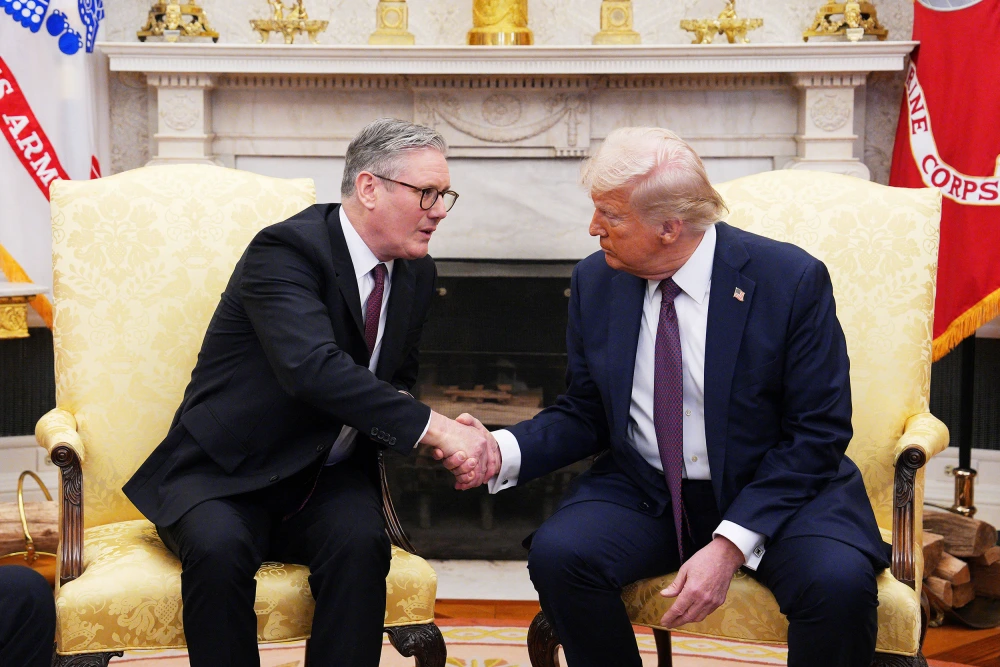President Donald Trump announced early Thursday that he plans to sign a trade agreement with the United Kingdom, marking the first such deal since he imposed sweeping global tariffs that have shaken financial markets and raised concerns about global economic disruption.
In a message posted on Truth Social, Trump stated: “This should be a very big and exciting day for the United States of America and the United Kingdom. Press Conference at The Oval Office, 10 A.M. Thank you!”
Trump has frequently claimed that several countries are eager to reach trade agreements with the U.S. to avoid the harshest impacts of the tariffs he introduced last month. If finalized, the U.K. deal would be the first of its kind. According to the U.S. Trade Representative’s office, only four countries import more American goods than the United Kingdom.
In a post on Truth Social early Thursday, former President Donald Trump teased a “Big News Conference tomorrow morning at 10:00 A.M., The Oval Office, concerning a MAJOR TRADE DEAL WITH REPRESENTATIVES OF A BIG, AND HIGHLY RESPECTED, COUNTRY. THE FIRST OF MANY!!!”
The New York Times first reported on Wednesday that Trump was preparing to announce a trade agreement with the United Kingdom, citing three sources familiar with the matter.
If confirmed, the deal would represent a significant win for Trump, who has claimed that nations are “dying to make a deal” following his sweeping tariff announcement on April 2—a day he dubbed “liberation day.”
At the time, Trump’s trade adviser Peter Navarro boldly predicted “90 deals in 90 days.” But more than a month later, no agreements have been finalized, while countries around the world—most notably China—have criticized the tariffs as unfair and damaging. Meanwhile, Trump faces growing domestic concerns about rising consumer prices.
The U.K. government acknowledged ongoing discussions with Washington in a statement early Thursday but stopped short of confirming a finalized deal. A spokesperson for Prime Minister Keir Starmer stated that an update would be provided later in the day. Britain’s Department for Business and Trade declined to comment on what it called “speculation.”
“The United States is an indispensable ally for both our economic and national security,” said a spokesperson for Number 10. “Talks on a deal between our countries have been continuing at pace and the Prime Minister will update later today.”
Speaking at the swearing-in ceremony of his new Middle East envoy, Steve Witkoff, on Wednesday, Trump said the United Kingdom was eager to reach an agreement. “I think that United Kingdom, like every other country, they want to—they want to go shopping in the United States of America,” he said during the Oval Office event.
If signed, the agreement would be the first public trade deal announced by Trump since he rolled out—and later suspended—new tariffs affecting dozens of nations.

Trump has long argued that other countries would be eager to strike trade agreements with the United States, claiming that the threat of increased tariffs would drive them to negotiate favorable terms.
However, on Tuesday, Trump expressed frustration with repeated questions about the progress of such deals. “Everyone says, ‘When, when? When are you going to sign deals?’ We don’t have to sign deals,” he told reporters. “They have to sign deals with us. They want a piece of our market. We don’t want a piece of their market.”
Trump’s tariff policies have drawn sharp criticism amid concerns they could raise consumer prices and hurt the broader economy. Even Trump has acknowledged that import taxes could result in higher costs. Politically, the tariffs have proven unpopular, with recent polls from CNBC and NBC News Stay Tuned showing particularly low approval ratings for his handling of trade policy.
Meanwhile, the United Kingdom has been eager to secure a trade deal with the U.S.—its largest trading partner—to ease the impact of the tariffs on key sectors such as automotive, food and beverage, and steel. Total trade between the two countries amounts to £314.6 billion ($417.6 billion) annually, including £196 billion ($260 billion) in British exports to the U.S.
Since leaving the European Union in 2020 under the Brexit agreement, the U.K. has been actively pursuing new trade partnerships to replace the seamless access it once had to the EU market. This week, Britain announced a trade agreement with India, projected to boost the U.K.’s annual GDP by £4.8 billion ($6.3 billion).
Trump, a vocal supporter of Brexit during his first term, had previously hinted at the prospect of a U.K.-U.S. trade deal, aligning it with his broader push for bilateral agreements.

